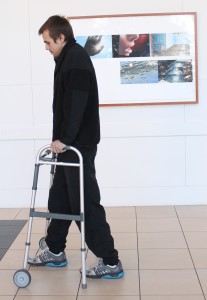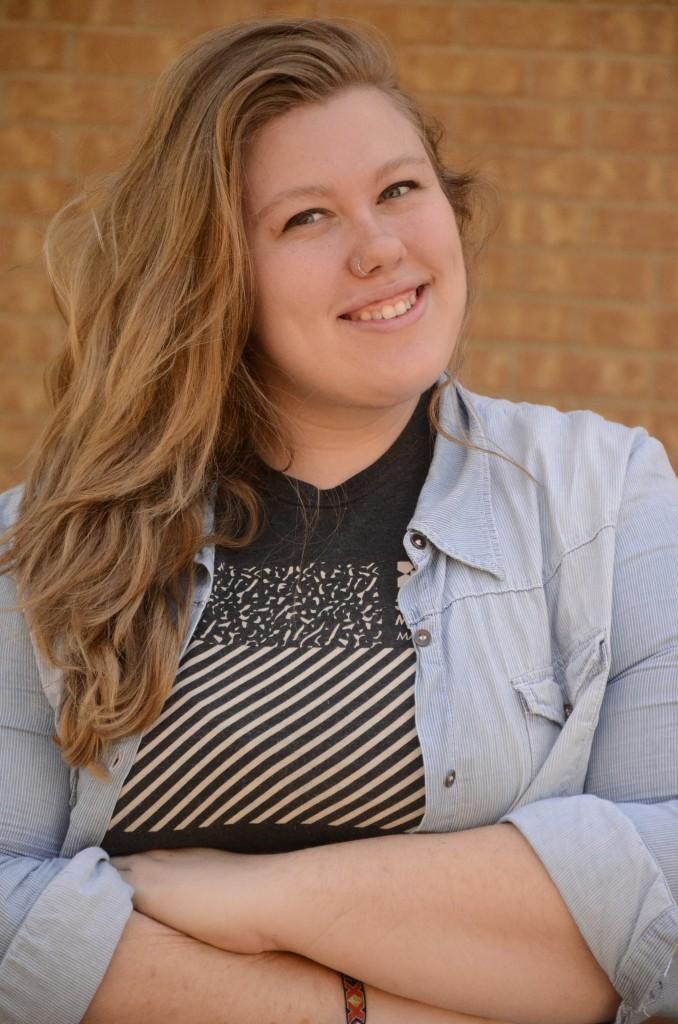
By Kirsten Mahon/tr news editor
Standing up straight, Wayne Everett looks about as able-bodied as the next student. But when it’s time to move, Everett can be found lagging far behind everyone else.
Everett, 26, suffers from spondylolisthesis, a debilitating spinal disease that most likely originated from his service in the Army. As an ex-soldier, Everett seeks support for his painful condition yet receives very little from the institution where he spent part of his life.
“They want to say that the issues I have come from my genetics and my family,” he said, sifting through a bag of papers.
Each day, Everett drags this baggage along with him. In his book bag is every paper, every record of his previous vaccinations, his requests for non-deployment, re-deployment and documents from medical military officials claiming that his condition was not related to his time in the military. These statements have determined that Everett goes moneyless without a job until his claims are proved correct.
On paper, Everett hasn’t yet been able to document that his condition is directly linked to his active duty.
“I didn’t have any service connections, so it’s almost like I’m a nobody,” said the ex-soldier.
He once marched, carrying a full rucksack, across the South Korean countryside in the cold to have his water bottle explode mid-trek. The water leaked and froze to his body, causing a hypothermic attack once he returned to his barracks. Everett only laughs that his commander didn’t notice he was asleep in recovery the entire next day.
“He didn’t even notice I was gone. No trouble,” he laughed, remembering his relief.
It was common for Everett and his fellow comrades to be sent on treacherous hikes, carrying unreal amounts of equipment in whatever conditions were cast upon them. For instance, the Manchu Mile was a 25-mile trek they had to march through the South Korean terrain to help soldiers stay in shape, to prepare them for a war they never had to fight.
He and other soldiers shared the willingness and the prepared-for-anything attitude required of every deployed military service member. This attitude kept them willing to do whatever was asked, regardless of what it could do to their bodies and psyches.
“If you’re in pain, you’d better be on the ground screaming,” he said. “If you throw up, that doesn’t mean you’re stopping. It just means you get to the back of the line and hope you don’t throw up on somebody.”
In 2009, Everett hadn’t begun to really suffer yet. He was young, agile and defiant. He had no one guiding him other than his parents. He had no one to warn him of the battle he was about to fight.
Everett could run two miles in 11 minutes and 10 seconds. Now the idea of walking two miles is impossible to him.
“I would never make it,” he said.
Everett recently had surgery on his back and wears a brace daily. As he ambles down the hallway on TR Campus, he uses the walls to hold him for the long, exhausting journey.
“I do need a cane,” he said quietly.
According to Veterans Affairs, ex-soldiers who entered service during the time frame that Everett did and served their full time did should receive benefits from the VA if they were discharged from the military because of a disability that’s not pre-existing.
When Everett entered the Army, he said he had no pre-existing medical complications.
“It’s a waiting game,” said Robert Tracy, TR veterans association president.
Tracy said that to weed out the riff-raff from the vets who desperately need the benefits, the VA often forces vets to go through a ridiculously long process of paperwork, phone calls, hold-waits and miscommunication before an ex-soldier might actually begin to receive his or her deserved benefits.
Everett’s runaround began in 2009.
“I was lined up to deploy in October,” he said, referring to 2009. “But then they said, ‘Oh, wait, no. You need to see someone about your back.’”
Everett has papers declaring his discharge in October 2009. He has more papers stating his non-deployable status that same month. None of these papers explain why he was honorably discharged, only that it was not due to medical reasons. This is after he’d had MRI scans where a trained military official (not an actual doctor) determined something was wrong with his back. They never showed Everett his X-rays or MRI scans.
All hospitals will normally recycle X-ray records after enough time has passed, Tracy said.
“He might be able to see them now,” Tracy said, “if they haven’t used them for silver.”
Randy Noler, spokesman for the Veterans Affairs department in Washington, said that providing all documentation of discharge and medical records will help prove a case.
“To get benefits, you have to be service-connected,” he said. “Right now, there is a backlog.”
Noler said the VA didn’t expect veterans to be completely literate of the system structure or the steps to take when they return from active duty. To alleviate the stress of so many vets returning who haven’t been able to receive proper benefits, Noler said the VA has recently begun to work on cases dating two years back.
Noler said veterans who prove a service connection should receive benefits up to five years after 9/11. Veterans should use the VA’s website, www.
ebenefits.va.gov, where they can apply online for their benefits and to receive care.
Kathy Holleman, TR office assistant and VA representative for TCC, said part of the problem could come from a lack of funding. Noler said that today’s vets are averaging eight to 10 conditions, about five conditions more on average than veterans returning from the Vietnam War.
“Without the money, they can’t hire the people they need,” Holleman said. “They’re very crowded and very busy.”
Holleman said she could understand if the VA is unable to treat all injured and ill vets who return from service. But she still believes something should be in place to accommodate these soldiers. Police officers and firefighters and the like should receive these benefits too.
“They should get that much because they did serve for their country,” she said. “It’s different from being a pro football player.”
Each day is a battle for Everett. The 26-year-old wakes up in pain every morning, suffering from this disease most commonly affecting those in their 70s. This disease normally takes an injury to awaken it.
“No one in my family has this,” he said.
It’s still possible for his parents to be carriers of the disease without showing symptoms, but Everett is still younger than most who experience the disease.
If he’d been told about the disease early enough, Everett said, his rehabilitation would have slowed the onset of the symptoms much earlier, and he wouldn’t have needed the surgery he had and wouldn’t need a cane.
His surgery was the last resort to relieve pain and to reposition the vertebrae in his back that were colliding and slipping, stretching apart the tendons that held his back together.
“People are normally restricted to bed rest for a year after a spinal fusion,” he said.
The surgery was less than six months ago, but he has to go to school to keep busy and to give himself hope.
“If I had a list of things to do each day,” he said, “one of them would get done.”
Everett lives in an apartment by himself. His parents and siblings are supportive but live their own lives. His sister works in communications and lives with her family in California. His brothers have degrees that allow them to pick practically any job they want. His parents are retired.
The youngest of his family, Everett was expected to do as well as his siblings. The disease wears him out just walking, causing him to take naps throughout the day.
“The VA treated it as psychosomatic,” Everett said. “They want me to prove where it is in service that I would have hurt my back to get something like this,” he said.
Now, Everett is going through the back door. He has applied for disability as a civilian and is hoping to recover from his surgery and move on with his life, all the while appealing for the VA to take him seriously.
Everett is waiting patiently to receive some type of financial support that will allow him to recover to healthiness. The battle has taken nearly four years so far, and he isn’t even 30 yet, let alone old enough to be struggling from a disease commonly found in senior citizens.
As he shoved his stack of papers back into his bag, ready to return home from an exhausting day of running errands between doctors’ offices, VA officials and school counselors, Everett said he didn’t remember having to fight like this in South Korea, where he was deployed.
“The only thing I’ve had to put up a fight against is my own country,” he said.

























